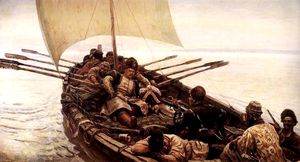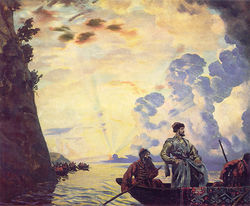Stenka Razin

Stepan (Sten'ka) Timofeyevich Razin (Russian: Степан (Стенька) Тимофеевич Разин, Russian pronunciation: [sʲtʲɪpˈɑn (sʲtʲˈenʲkə) tʲɪmɐˈfʲeɪvʲɪt͡ɕ ˈrɑzʲɪn]; 1630 – June 16 [O.S. June 6] 1671) was a Cossack leader who led a major uprising against the nobility and Tsar's bureaucracy in South Russia.
Contents |
Early life
He is first noted by history in 1661, as part of a diplomatic mission from the Don Cossacks to the Kalmyks. That same year Razin went on a long-distance pilgrimage to the great Solovetsky Monastery on the White Sea for the benefit of his soul. After that, all trace of him is lost for six years, when he reappears as the leader of a robber community established at Panshinskoye, among the marshes between the rivers Tishina and Ilovlya, from whence he levied blackmail on all vessels passing up and down the Volga.
A long war with Poland in 1654-1667 and Sweden in 1656-1658 put heavy demands upon the people of Russia. Taxes increased as did conscription. Many peasants hoping to escape these burdens fled south and joined bands of Razin's marauding Cossacks. They were also joined by many other disaffected with the Russian government, including people of the lower classes as well as representatives of non-Russian ethnic groups, such as Kalmyks, that were being oppressed.
Razin's first considerable exploit was to destroy the great naval convoy consisting of the treasury barges and the barges of the patriarch and the wealthy merchants of Moscow. Razin then sailed down the Volga with a fleet of thirty-five galleys, capturing the more important forts on his way and devastating the country. At the beginning of 1668 he defeated the voivode Yakov Bezobrazov, sent against him from Astrakhan, and in the spring embarked on a predatory expedition into Daghestan and Persia which lasted for eighteen months.
Persian expedition

Sailing into the Caspian Sea, he ravaged the Persian coasts from Derbend to Baku, massacred the inhabitants of the great emporium of Rasht, and in the spring of 1669 established himself on the isle of Suina, off which, in July, he annihilated a Persian fleet sent against him. Stenka Razin, as he was generally called, had now become a potentate with whom princes did not disdain to treat.
In August 1669 he reappeared at Astrakhan, and accepted a fresh offer of pardon from tsar Aleksey Mikhailovich there; the common people were fascinated by his adventures. The lawless Russian border region of Astrakhan, where the whole atmosphere was predatory and many people were still nomadic, was the natural milieu for such a rebellion as Razin's.
Open rebellion

In 1670 Razin, while ostensibly on his way to report himself at the Cossack headquarters on the Don, openly rebelled against the government, captured Cherkassk, Tsaritsyn and other places, and on June 24 burst into Astrakhan itself. After massacring all who opposed him (including two Princes Prozorovsky) and giving the rich bazaars of the city over to pillage, he converted Astrakhan into a Cossack republic, dividing the population into thousands, hundreds and tens, with their proper officers, all of whom were appointed by a veche or general assembly, whose first act was to proclaim Stepan Timofeyevich their gosudar (sovereign).
After a three weeks carnival of blood and debauchery Razin quit Astrakhan with two hundred barges full of troops to establish the Cossack republic along the whole length of the Volga, as a preliminary step towards advancing against Moscow. Saratov and Samara were captured, but Simbirsk defied all efforts, and after two bloody encounters close at hand on the banks of the Sviyaga River (October 1 and 4), Razin was ultimately routed by the army of Yuri Baryatinsky and fled down the Volga, leaving the bulk of his followers to be extirpated by the victors.
But the rebellion was by no means over. The emissaries of Razin, armed with inflammatory proclamations, had stirred up the inhabitants of the modern governments of Nizhny Novgorod, Tambov and Penza, and penetrated even so far as Moscow and Novgorod. It was not difficult to stir the oppressed population to revolt by promising deliverance from their yoke. Razin proclaimed that his object was to root out the boyars and all officials, to level all ranks and dignities, and establish Cossackdom, with its corollary of absolute equality, throughout Muscovy.

Even at the beginning of 1671 the issue of the struggle was doubtful. Eight battles had been fought before the insurrection showed signs of weakening, and it continued for six months after Razin had received his quietus. At Simbirsk his prestige had been shattered. Even his own settlements at Saratov and Samara refused to open their gates to him, and the Don Cossacks, hearing that the patriarch of Moscow had anathematized Stenka, also declared against him.
In 1671 he and his brother Frol Razin were captured at Kaganlyk, his last fortress, and carried to Moscow, where, after tortures, Stepan was quartered alive in the Red Square at the Lobnoye Mesto.
Razin is the subject of a symphonic poem by Alexander Glazunov and a cantata by Shostakovich.
Song
Stenka Razin is the hero of a popular Russian folk song, Ponizovaya Volnitsa, better known by the words Volga, Volga mat' rodnaya. The words were written by Dmitri Sadovnikov (Дмитрий Николаевич Садовников) in 1883; the music is folk. The song gave the title to the famous Soviet musical comedy Volga-Volga. The melody was used by Tom Springfield in the song "The Carnival Is Over" that placed The Seekers at #1 in 1965 in Australia and the UK.
The lyrics of the song were dramatized in one of the very first Russian narrative films, Stenka Razin directed by Vladimir Romashkov in 1908. The film lasts about 10 minutes. The screenplay was written by Vasily Goncharov, and the music (the first film music to be specially written to accompany a silent film) was by Mikhail Ippolitov-Ivanov.
| Part of a series on |
| Cossacks |
|---|
 |
| Cossack hosts |
| Azov · Black Sea · Buh · Caucasus · Danube · Don · Volga · Ural · Terek · Kuban · Orenburg · Astrakhan · Siberian · Baikal · Amur · Semirechye · Ussuri · Zaporozhia |
| Other groups |
| Danube (Sich) · Tatar Cossacks · Nekrasov · Turkey · Jewish Cossacks |
| History |
| Registered Cossacks · Kosiński Uprising · Nalyvaiko Uprising · Khmelnytsky Uprising · Hadiach Treaty · Hetmanate · Colonisation of Siberia · Bulavin Rebellion · Pugachev's Rebellion · 1st Cavalry Army · Decossackization · Betrayal · XV SS Cossack Cavalry Corps · 1st Cossack Division |
| Famous Cossacks |
| Bohdan Khmelnytsky · Petro Sahaidachny · Ivan Vyhovsky · Petro Doroshenko · Ivan Mazepa · Ivan Sirko · Yemelyan Pugachev · Stenka Razin · Andrei Shkuro · Pyotr Krasnov · Yermak Timofeyevich · |
| Cossack terms |
| Ataman · Hetman · Kontusz · Papakhi · Plastun · Szabla · Shashka · Stanitsa · Yesaul |
| Words in Russian | Transcribed | English language version |
| Из-за острова на стрежень, На простор речной волны, |
Iz-za ostrova na strezhen', Na prostor rechnoy volny, |
From beyond the wooded island To the river wide and free |
| На переднем Стенька Разин, Обнявшись, сидит с княжной, |
Na perednem Sten'ka Razin, Obnyavshis', sidit s knyazhnoy, |
On the first is Stenka Razin With his princess by his side |
| Позади их слышен ропот: Нас на бабу променял! |
Pozadi ikh slyschen ropot: Nas na babu promenyal! |
From behind there comes a murmur "He has left his sword to woo; |
| Этот ропот и насмешки Слышит грозный атаман, |
Etot ropot i nasmeshki Slyshit groznyi ataman, |
Stenka Razin hears the murmur Of his discontented band |
| Брови черные сошлися, Надвигается гроза. |
Brovi chornye soshlisya, Nadvigaetsya groza. |
His dark brows are drawn together As the waves of anger rise; |
| "Ничего не пожалею, Буйну голову отдам!" — |
"Nichevo ne pozhaleyu, Bujnu golovu otdam!" — |
"I will give you all you ask for Head and heart and life and hand." |
| "Волга, Волга, мать родная, Волга, русская река, |
"Volga, Volga, mat' rodnaya, Volga, russkaya reka, |
Volga, Volga, Mother Volga Wide and deep beneath the sun, |
| Чтобы не было раздора Между вольными людьми, |
Shtoby ne bylo razdora Mezhdu vol'nymi ljud'mi, |
So that peace may reign forever In this band so free and brave |
| Мощным взмахом поднимает Он красавицу княжну |
Moshchnym vzmakhom podnimaet On krasavitsu knyazhnu |
Now, with one swift mighty motion He has raised his bride on high |
| "Что ж вы, братцы, приуныли? Эй, ты, Филька, черт, пляши! |
"Shto zh vy, bratsy, priunyli? Ej, ty, Fil'ka, chert, pljashi! |
"Dance, you fools, and let's be merry What is this that's in your eyes? |
| Из-за острова на стрежень, На простор речной волны, |
Iz-za ostrova na strezhen', Na prostor rechnoy volny, |
From beyond the wooded island To the river wide and free |
References
 This article incorporates text from a publication now in the public domain: Chisholm, Hugh, ed (1911). Encyclopædia Britannica (Eleventh ed.). Cambridge University Press.
This article incorporates text from a publication now in the public domain: Chisholm, Hugh, ed (1911). Encyclopædia Britannica (Eleventh ed.). Cambridge University Press.- Sakharov, Andrei Nikolaevich (1973) Stepan Razin (Khronika XVII v.) Moskva, "Mol. gvardiia", 319 p. Biography in Russian.
- Field, Cecil (1947) The great Cossack; the rebellion of Stenka Razin against Alexis Michaelovitch, Tsar of all the Russias London, H. Jenkins, 125 p. Biography in English.